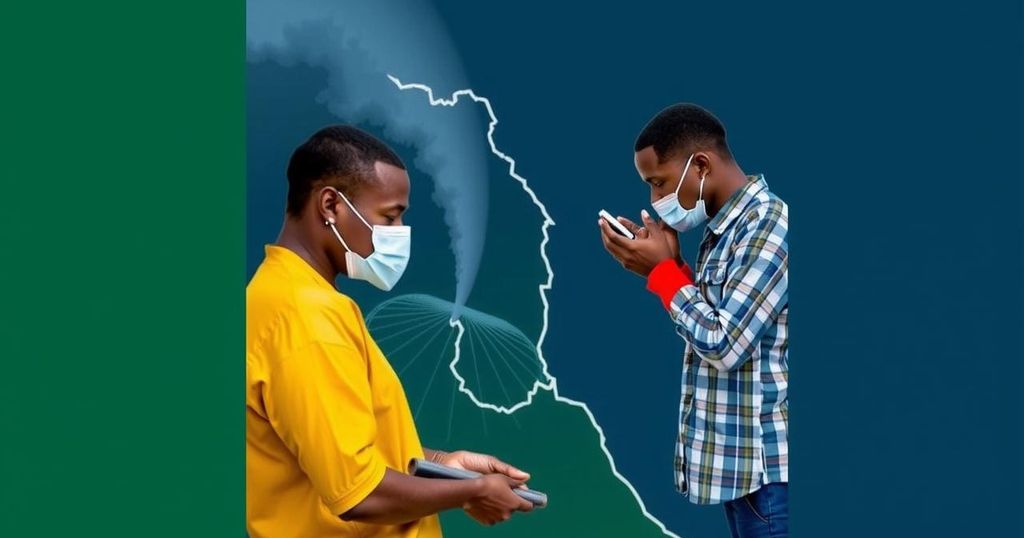The spread of mpox in Uganda is alarming, with 830 cases recorded across 19 states, including new clusters near the DRC border. In the past week, 61 new cases and one death were confirmed, predominantly affecting adult men. Meanwhile, Rwanda reported four new Marburg cases, bringing the total to 66 cases and a 23% fatality rate. Vaccination efforts against both diseases are underway, but challenges remain, particularly in Nigeria and Rwanda’s approach to Marburg vaccinations.
The emergence and spread of mpox in Uganda have escalated to a critical concern, with approximately 830 cases documented across 19 states, the Africa Centres for Disease Control and Prevention (Africa CDC) has reported. The initial case was identified within Nakasongola Prison in Central Uganda, yet recent transmissions have been noted near the Demographic Republic of Congo (DRC) border, particularly among fishing communities which are witnessing new clusters of infection. Dr. Ngashi Ngongo, the mpox lead from the Africa CDC, disclosed during a media briefing that 61 new cases had emerged in the past week, accompanied by one reported fatality. Comparatively, while children comprise 50% of the mpox cases in the DRC, they constitute only 12.5% of Uganda’s cases. A significant 63% of the recorded cases in Uganda involve adult males, with the sexually transmissible clade 1b being the prevalent strain. Additionally, Mauritius has reported its inaugural mpox case, while the United Kingdom has confirmed its first case of clade 1b in an individual who recently traveled to an affected region. The weekly African mpox case count has seen an increase of 2,766 cases, similar to trends observed in previous weeks, predominantly from the DRC and Burundi. Vaccination efforts have seen nearly 900,000 mpox vaccines distributed to nine nations, with campaigns particularly successful in the DRC and Rwanda, though Nigeria has recently delayed the commencement of its vaccination initiative. In Rwanda, health authorities disclosed four additional Marburg cases over the last fortnight, including a health care worker and three individuals connected to other cases, as stated by Dr. Yvan Butera, the Minister of State in the health ministry. Two further fatalities have been reported within the same timeframe. Rwanda’s total Marburg count now stands at 66 cases, with a mortality rate of approximately 23%, and nearly 6,000 individuals having undergone testing. Vaccination efforts have seen around 1,600 frontline workers inoculated against the virus. The outbreak’s source was traced to fruit bats found in a mine near Kigali, leading to infections of the initial case who had visited the site. Furthermore, the Sabine Vaccine Institute has dispatched an additional 1,000 investigational vaccines to Rwanda, which will be utilized in a randomized clinical trial within a current open-label study. Rwanda previously declined the World Health Organization’s (WHO) stipulated protocol that proposed a control group receiving vaccinations three weeks after the trial group. Instead, Rwanda has opted for a comprehensive vaccination strategy for all participants in the trial, classified as a Phase 2 rapid response open-label trial, which is sponsored by the Rwanda Biomedical Centre. The updated protocol dictates that approximately 1,000 individuals at risk, including mine workers, would be assigned to receive Sabin’s proposed single-dose investigational vaccine, structured in a one-to-one randomization; one half of participants would receive immediate vaccination while the other half would do so after a 21-day delay, coinciding with the end of the disease’s incubation period. It must be noted that Sabin’s Marburg vaccine has yet to be validated for its clinical efficacy among recipients.
Mpox, previously known as monkeypox, is a viral disease that has recently emerged in several African nations. Uganda’s rising mpox infection rates, especially in light of its close geographical ties to the DRC where pediatric cases significantly surpassed those of Uganda, necessitate an urgent public health response. This disease has distinct patterns of transmission, particularly highlighting the implications of sexual transmission with specific clades. Concurrently, Marburg, a rare but severe viral hemorrhagic fever, has also emerged as a public health concern in Rwanda. Understanding the intersection of these two infectious diseases is crucial for effective health policy formulation and public health safety measures within the region.
The current mpox situation in Uganda reflects a significant and alarming public health crisis, necessitating urgent intervention and continued surveillance, particularly in vulnerable communities. The emergence of Marburg cases in Rwanda further compounds the challenges faced by public health systems in the region. A coordinated approach, emphasizing vaccination and community engagement, is essential to curtail the spread of these infectious diseases and safeguard public health.
Original Source: healthpolicy-watch.news






